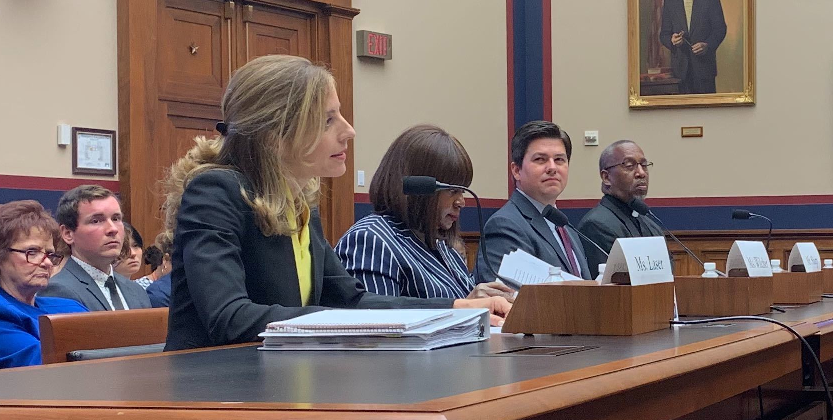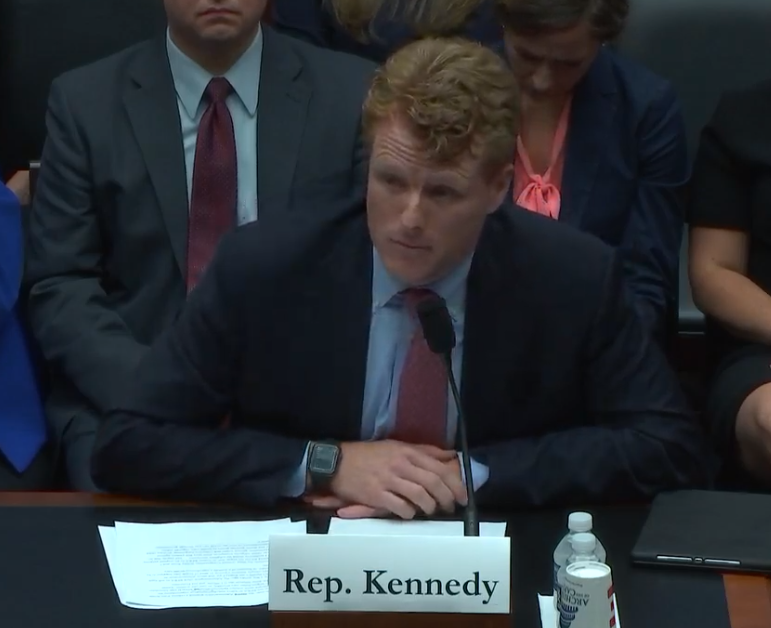Americans United President and CEO Rachel Laser made the case directly to Congress that the Do No Harm Act is urgently needed to block the Trump administration’s ongoing attacks on religious freedom.
Laser testified for nearly four hours on June 25 before the U.S. House of Representatives’ Committee on Education and Labor about the misapplication of the Religious Freedom Restoration Act (RFRA) and its remedy: the Do No Harm Act (DNHA), a bill that Americans United’s public policy experts helped get introduced.

(PHOTO: AU President and CEO Rachel Laser testifies before Congress.)
“The Trump administration is ignoring the intent and constitutional limitations on RFRA,” Laser told members of Congress. “It’s weaponizing RFRA to undermine civil rights protections, deny people access to health care and government services, and even deny children loving homes. This harms LGBTQ people, women, the nonreligous and religious minorities the most.
“RFRA, a statute designed as a shield to protect religious freedom, is now being used as a sword to cause harm,” Laser continued. “Congress should pass the Do No Harm Act, a simple yet critical bill designed to restore RFRA to its original intent. It will preserve the law’s power to protect religious freedom while clarifying it may not be used to harm others.”
The hearing, “Do No Harm: Examining the Misapplication of the Religious Freedom Restoration Act,” was held by the committee that is chaired by U.S. Rep. Robert C. “Bobby” Scott (D-Va.), one of the leading co-sponsors of the Do No Harm Act, whose work made the hearing possible.
U.S. Rep. Joe Kennedy III (D-Mass.), who is the lead sponsor of the DNHA in the House, also testified, as did the Rev. Jimmie R. Hawkins, director of the Presbyterian Church (U.S.A.) Office of Public Witness, and Shirley J. Wilcher, executive director of the American Association for Access, Equity and Diversity.
Republican members of the committee invited two lawyers with ties to the religious extremist legal group Alliance Defending Freedom (ADF) to testify in opposition to the Do No Harm Act: U.S. Rep. Mike Johnson (R-La.), a former ADF attorney, and Matt Sharp, ADF’s senior counsel.
Johnson and Sharp repeatedly tried to miscast the DNHA as legislation that would replace or repeal RFRA’s protections. But as Laser stressed during the hearing, “RFRA isn’t going away.” Rather, the DNHA would restore RFRA to its original intent of protecting religious freedom, especially for religious minorities, while clarifying that it cannot be used to justify harm to others.
The Do No Harm Act confirms what generations of civic history, constitutional law and American experience have proved true: If civil and legal rights exist only in the absence of a neighbor’s religious objection, then they are not rights but empty promises.
~ U.S. Rep. Joe Kennedy III (D-Mass.)
“The Do No Harm Act confirms what generations of civic history, constitutional law and American experience have proved true: If civil and legal rights exist only in the absence of a neighbor’s religious objection, then they are not rights but empty promises,” Kennedy said.
Laser, Scott, Kennedy and others outlined the history of RFRA: It was passed in 1993 by a broad, bipartisan coalition of supporters – including Americans United – to restore religious freedom protections that were undermined by a U.S. Supreme Court decision. In an opinion written by the late Justice Antonin Scalia in 1990, the court ruled in Employment Division v. Smith that two Native American men who had used peyote during a religious ceremony could be fired and denied unemployment benefits for failing a drug test.
“RFRA was meant to be a shield to protect: because Native Americans should be free to practice their religion; Jewish children should be allowed to wear yarmulkes in public schools that prohibit them; fire department restrictions on facial hair should contain exceptions for those of Muslim faith,” Kennedy said.
“However, over the years, RFRA has morphed from a shield of protection to a sword of infringement, allowing employers to undermine basic workplace protections, organizations to stonewall child labor investigations, and health providers to deny needed care for victims of sexual abuse,” Kennedy continued. “The Supreme Court’s 2014 ruling in Burwell v. Hobby Lobby Stores opened these floodgates even further, providing a path for corporations to cite faith in discriminating against employees.”

(PHOTO: U.S. Rep. Joe Kennedy (D-Mass.), a co-sponsor of the Do No Harm Act.)
The hearing fell almost on the fifth anniversary of the Hobby Lobby decision, in which the Supreme Court ruled that certain for-profit corporations could refuse to provide required health benefits such as contraception based on their owners’ religious beliefs.
Health care providers, employers and universities citing religious beliefs to undermine the reproductive freedom of patients, employees and students was a frequent concern addressed during the hearing, including by U.S. Rep. Pramila Jayapal (D-Wash.), who just a few weeks earlier had written a column in The New York Times about the difficult choice she’d made to have an abortion and her fears that politicians were using their personal beliefs to prevent others from having the freedom to make their own reproductive choices.
“I cannot imagine how much more difficult that choice would have been if I had been denied care due to discrimination,” Jayapal said. “I’ve watched in horror as I have seen the Republicans and Trump administration strip away [the Affordable Care Act’s] health care protections, leaving millions of Americans vulnerable to discrimination or denial of access to critical health care services. And there has been an attack on Americans’ health care by abusing RFRA as a basis to discriminate against women, for example, who are seeking access to reproductive health care services.”
Laser agreed and noted that Americans United is in court on behalf of University of Notre Dame students, battling the Trump administration’s rules that would allow employers and universities to use religion to deny employees and students access to birth control. “It sort of boggles my mind that we’re in 2019 and still needing to talk about why contraception is important to women,” she said.
Laser testified about other ways the Trump administration is weaponizing religious freedom, including allowing taxpayer-funded foster care agencies in South Carolina (and potentially nationwide) to turn away prospective volunteers and parents because they are the “wrong” religion or LGBTQ. Laser spoke of AU client Aimee Maddonna, a South Carolina mother of three who was rejected by Miracle Hill Ministries because she’s Catholic and cannot commit to the evangelical Protestant agency’s doctrinal statement of faith.
Several members of Congress said they opposed the government funding such discrimination. U.S. Rep. Mark Takano (D-Calif.) called out ADF’s Sharp when he refused to directly answer whether government contractors should be allowed to use religion as the basis for discrimination: “The answer is very simple and you’re dancing around it,” Takano said, before asking Laser the same question.
Laser said the answer was clear: “Here’s the thing: You can’t have it both ways. If faith-based groups want to be eligible to receive government funding to perform government services, then they have to play by the same rules as everyone else. We have antidiscrimination laws in place because those are our shared, secular, American laws that we’ve passed. … Religion should not be used to carve out exceptions from where the government has committed to providing services to people in need.”
You can’t have it both ways. If faith-based groups want to be eligible to receive government funding to perform government services, then they have to play by the same rules as everyone else.
~ AU’s Rachel Laser
U.S. Rep. Jahana Hayes (D-Conn.) said she raised her daughter as a single mother and took issue with a foster care agency turning away loving parents on the basis of marital status in addition to religious beliefs or sexuality. She stressed her Christian faith and the presence of the cross necklace she wears. “Wearing this cross does not ever give me the right to impose my beliefs upon others or to discriminate [based] upon immutable characteristics,” Hayes said. “While I want others to respect my right to religious freedom, I hope that my cross shows them my willingness, not my intolerance, to protect the right of everyone to practice their religion, or no religion at all. That is what our founding fathers said. That is what this country was founded upon.”
Rep. Ilhan Omar (D-Minn.), one of the first Muslim women to be elected to Congress and a Somali refugee, also stressed the importance of faith and America’s promise of religious freedom.
(PHOTO: U.S. Rep. Ilhan Omar (D-Minn.) listens to AU’s Rachel Laser testify about religious freedom.)
“For many of us, religious freedom is extremely important. It is life and death in this country. Many of us fled our countries to come to the United States because that is the one thing that distinguishes us from many countries. But it’s also important that we have a secular government and protect people’s civil rights and access to those civil rights.
“If you have members of Congress that are legislating laws in accordance with their faith in regards to abortion or LGBTQ [rights] or women or any of those things, that should be prohibited within our Constitution?” Omar asked Laser.
“You are not allowed to impose, through the government, your religious beliefs on others,” Laser agreed. “That’s not what religious freedom is about. That’s not what our country rests on.”


